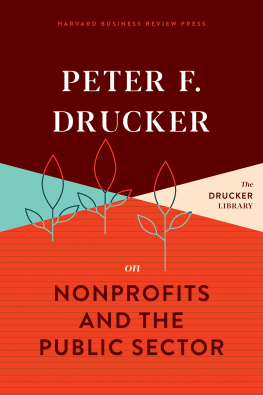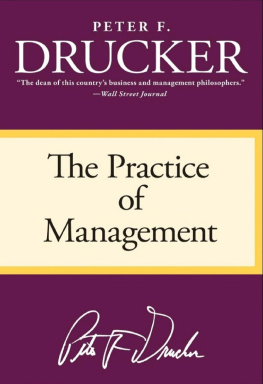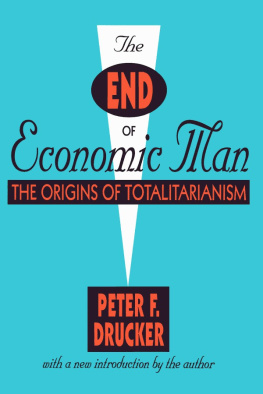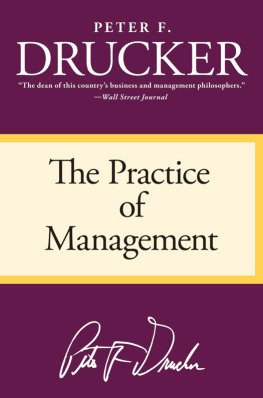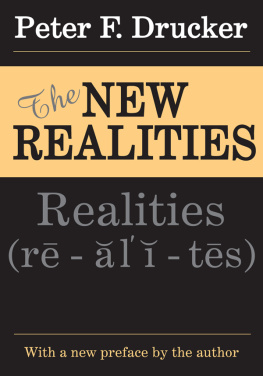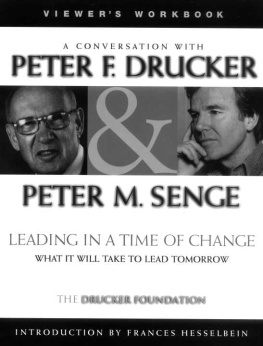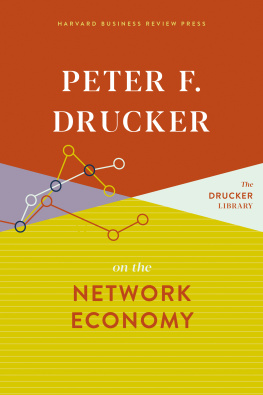Peter F. Drucker - Peter F. Drucker on Nonprofits and the Public Sector
Here you can read online Peter F. Drucker - Peter F. Drucker on Nonprofits and the Public Sector full text of the book (entire story) in english for free. Download pdf and epub, get meaning, cover and reviews about this ebook. year: 2020, publisher: Lightning Source Inc. (Tier 2), genre: Politics. Description of the work, (preface) as well as reviews are available. Best literature library LitArk.com created for fans of good reading and offers a wide selection of genres:
Romance novel
Science fiction
Adventure
Detective
Science
History
Home and family
Prose
Art
Politics
Computer
Non-fiction
Religion
Business
Children
Humor
Choose a favorite category and find really read worthwhile books. Enjoy immersion in the world of imagination, feel the emotions of the characters or learn something new for yourself, make an fascinating discovery.
- Book:Peter F. Drucker on Nonprofits and the Public Sector
- Author:
- Publisher:Lightning Source Inc. (Tier 2)
- Genre:
- Year:2020
- Rating:4 / 5
- Favourites:Add to favourites
- Your mark:
- 80
- 1
- 2
- 3
- 4
- 5
Peter F. Drucker on Nonprofits and the Public Sector: summary, description and annotation
We offer to read an annotation, description, summary or preface (depends on what the author of the book "Peter F. Drucker on Nonprofits and the Public Sector" wrote himself). If you haven't found the necessary information about the book — write in the comments, we will try to find it.
Peter F. Drucker on Nonprofits and the Public Sector — read online for free the complete book (whole text) full work
Below is the text of the book, divided by pages. System saving the place of the last page read, allows you to conveniently read the book "Peter F. Drucker on Nonprofits and the Public Sector" online for free, without having to search again every time where you left off. Put a bookmark, and you can go to the page where you finished reading at any time.
Font size:
Interval:
Bookmark:
Grateful acknowledgment is made for permission to reprint:
Toward the Next Economics originally appeared in Public Interest, Fall 1980.
Saving the Crusade: The High Cost of Our Environmental Future originally appeared in Harpers Magazine, January 1972.
Business and Technology from Labor Technology and Productivity, edited by Jules Backman, New York University Press. Copyright 1974 by New York University. Reprinted by permission of The Bobbs-Merrill Company, Inc.
Multinationals and Developing Countries: Myths and Realities originally appeared in Foreign Affairs, October 1974.
What Results Should You Expect? A Users Guide to MBO reprinted from Public Administration Review, January/February 1976. 1976 by The American Society for Public Administration, 1225 Connecticut Avenue, N.W., Washington, D.C. All rights reserved. Reprinted by permission.
The Coming Rediscovery of Scientific Management originally appeared in Conference Board Record, June 1976. 1976 by The Conference Board, Inc. Reprinted by permission of The Conference Board Record.
The Bored Board from the Wharton Magazine, Vol. I, #1, Fall 1976. 1976 by The Wharton School of the University of Pennsylvania. Reprinted with permission.
After Fixed Age Retirement Is Gone from The Future of Business, edited by Max Ways for the Center of Strategic Studies, Georgetown University, Pergaman, 1978. 1978 by Georgetown University, Washington, D.C. Reprinted by permission of the Center for Strategic and International Studies.
Science and Industry: Challenges of Antagonistic Interdependence originally appeared in Science, May 25, 1979.
How to Guarantee Non-performance reprinted from Public Administration Review, March/April 1980 under the title The Deadly Sins in Public Administration. 1980 by The American Society for Public Administration, 1225 Connecticut Avenue, N.W., Washington, D.C. All rights reserved. Reprinted by permission.
Behind Japans Success originally appeared in Harvard Business Review, January/February 1981 under the title Japan Inc., Myths & Realities.
A View of Japan Through Japanese Art from Song of the Brush, Catalogue of the Sans Exhibition, Seattle Art Museum, 1979. Copyright 1979 by Peter F. Drucker. Reprinted by permission.
The Drucker Library
Peter F. Drucker on Technology
Peter F. Drucker on Business and Society
Peter F. Drucker on Management Essentials
Peter F. Drucker on Nonprofits and the Public Sector
Peter F. Drucker on Economic Threats
Peter F. Drucker on Globalization
Peter F. Drucker on Practical Leadership
Peter F. Drucker on the Network Economy

IN ITS FOUR-HUNDRED-YEAR HISTORY economics has passed through four major changes in its world view, its concerns, its paradigms. It is now in the throes of another, its fifth scientific revolution.
Economics today is very largely The House that Keynes Built. Even in the English-speaking world only a minority of economists are Keynesians in their specific theories. But the great majority, perhaps even in the Communist countries, are Keynesians in their mind-set, in what they see and consider important, in their concerns, in their basic assumptions. They tend to define themselves largely through their relationship to Keynesian economics, are near Keynesians or non-Keynesians or anti-Keynesians. Their terminologyGross National Product, for instance, or money supplyassumes the economic aggregates on which Keynesian economics is based. The views of economic activity, economic policy, economic theory which Keynes around 1930 propoundedor at least codifiedhave, fifty years later, become the familiar environment, the home-ground of economists regardless of persuasion. The Keynesians may not muster the biggest battalions. But they have occupied the commanding heights and thereby define the issues.
Yet both as economic theory and as economic policy Keynesian economics is in disarray. It is unable to tackle the central policy problems of the developed economiesproductivity and capital formation; indeed, Keynesian economics must deny that these problems could even exist. Nor is it able to provide theory that can encompass, let alone explain, observed economic reality and experience. And it has been proven to be entirely irrelevant to the economic needs and challenges of developing Third World countries, if not harmful to them.
Indeed, the two theoretical approaches which alone during these last ten or fifteen years have shown consistent predictive power are both incompatible with the Keynesian model: the theories of the Canadian-born Columbia University economist Robert Mundell, and those of the rational expectations school. Mundell, after thorough empirical studies, concluded more than ten years ago that Keynesian policies do not work in the international economy. He correctly predicted the failure of currency devaluations to correct the balance of payments, stem inflation, and improve competitive position. The rational expectations school goes even further; it postulates that governmental, that is, macro-economic, intervention is not just deleterious; it is futile and ineffectual.
But these new approaches are equally incompatible with pre-Keynesian theories, whether Neo-Classic or Marxist. What makes the present crisis of economics a genuine Scientific Revolution is our inability to go back to the economic world view which Keynes overturned. To be sure, most of the economic theorems, economic methodologies, economic terms found in the textbooks today will be found in the textbooks tomorrow. They will only be reinterpretedthe way quantum physics reinterprets Newtons Optics. After all, Keynes did not discard a single theorem of classical economics. He even retained Says Law, according to which savings always equal investments; it became a special case. And one of the most advanced tools of modern economics, Input-Output Analysis, goes back to the first attempt at economic analysis, the Physiocrats Tableau Economique more than two centuries ago. But as economic world view, or as economic system, the earlier theoriese.g., the disciplined orthodoxy of the Austrianswill not do. What made Keynes so compelling fifty years ago even to a doubter (as I must confess myself to have been even then) was the new vision he forced on us; we suddenly had to see a whole new realityand that reality is still with us and will not disappear. The Next Economics will be post-Keynesian. It cannot ignore Keynes, but it will have to transcend him.
There may be no Economics in the future. Totalitarian regimes, while greatly concerned with the economy, do not tolerate the postulate on which any discipline of economics must base itself: economic activity, though constrained and limited by non-economic rationality, concerns, and values, constitutes a discrete and separate sphere. Totalitarian regimes cannot accept economic activity as autonomous, internally consistent, and zweckrational within its boundaries. In a totalitarian regime, economics inexorably becomes a branch of accounting.
But if there is a future economics, it will differ fundamentally from the present one. We do not yet know what the economic theories of tomorrow will be. But we do know what the main problems, the main concerns, the main challenges will be. We do not know the Next Economics; but we can outline its specifications.
To do this, we have to look paradigmaticallythat is, as methodologists rather than as economistsat the economic world views underlying the four Scientific Revolutions in economics that preceded the one in which we find ourselves, and especially at the basic world view and at the assumptions of the last, the Keynesian system.
Font size:
Interval:
Bookmark:
Similar books «Peter F. Drucker on Nonprofits and the Public Sector»
Look at similar books to Peter F. Drucker on Nonprofits and the Public Sector. We have selected literature similar in name and meaning in the hope of providing readers with more options to find new, interesting, not yet read works.
Discussion, reviews of the book Peter F. Drucker on Nonprofits and the Public Sector and just readers' own opinions. Leave your comments, write what you think about the work, its meaning or the main characters. Specify what exactly you liked and what you didn't like, and why you think so.

